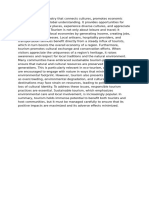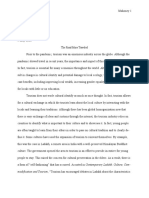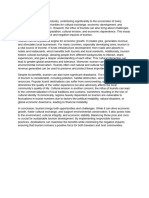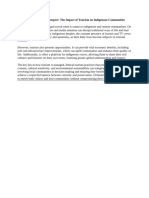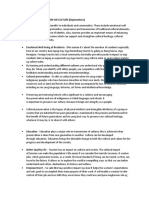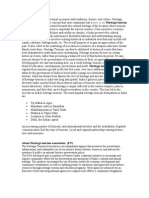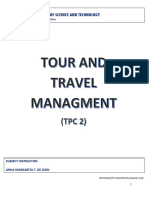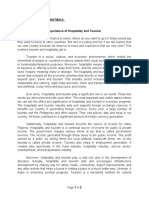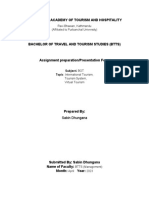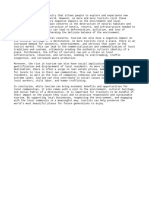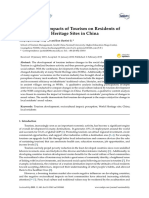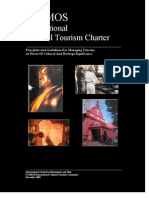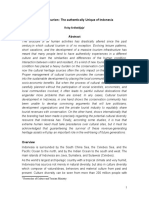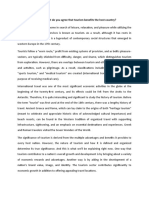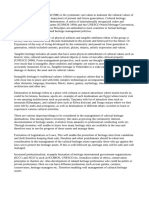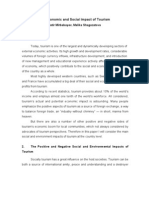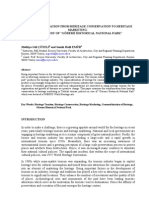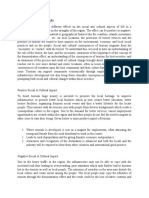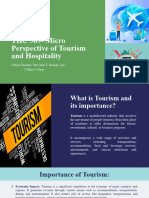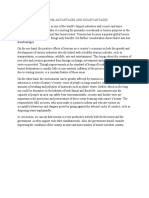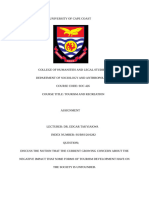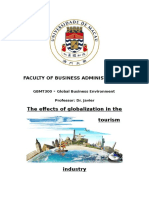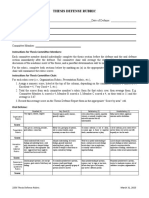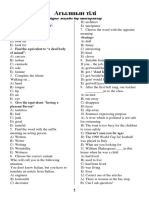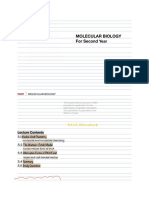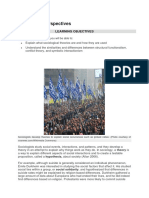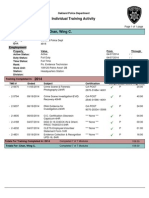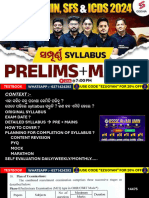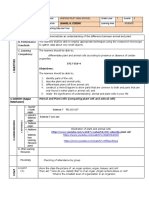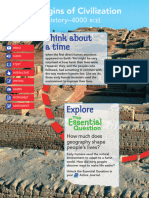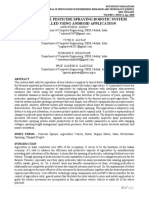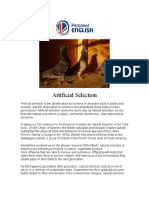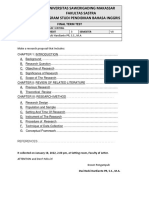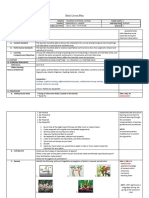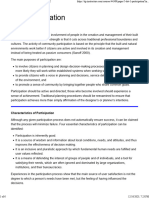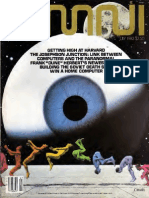Tourism
Tourism
Uploaded by
Ara NietoCopyright:
Available Formats
Tourism
Tourism
Uploaded by
Ara NietoCopyright
Available Formats
Share this document
Did you find this document useful?
Is this content inappropriate?
Copyright:
Available Formats
Tourism
Tourism
Uploaded by
Ara NietoCopyright:
Available Formats
Tourism: A Bridge to Global Understanding and Development
Tourism is more than just travel; it is a bridge that connects people, cultures, and economies
across the globe. As one of the largest and fastest-growing industries in the world, tourism
provides a platform for cultural exchange, economic development, and environmental awareness.
Its impact extends far beyond leisure, influencing how societies interact and develop.
The economic significance of tourism cannot be overstated. It generates substantial revenue for
nations, supports millions of jobs, and stimulates investment in infrastructure. From airlines and
hotels to local markets and artisans, tourism creates a ripple effect that benefits a wide range of
sectors. For developing countries, in particular, tourism often serves as a gateway to economic
growth, providing foreign exchange and opportunities for community development.
Tourism also fosters cultural exchange and understanding. By exploring new destinations,
travelers gain insights into diverse traditions, histories, and ways of life. This exchange
encourages mutual respect and appreciation, breaking down stereotypes and promoting global
harmony. Host communities, in turn, benefit from exposure to new ideas and perspectives,
enriching their own cultural landscapes.
However, the rapid growth of tourism presents significant challenges. Unchecked development
can lead to environmental degradation, loss of biodiversity, and the erosion of cultural heritage.
Overcrowding in popular destinations, or "over-tourism," strains local resources and
infrastructure, diminishing the quality of life for residents and the experience for visitors.
Addressing these issues requires a shift toward sustainable tourism, which prioritizes
environmental conservation, community well-being, and cultural preservation.
Technological advancements have further transformed the tourism industry. Digital platforms
make travel more accessible, allowing people to plan trips, book accommodations, and explore
destinations virtually. These innovations enhance convenience but also pose ethical concerns,
such as the potential commodification of cultural experiences. Striking a balance between
accessibility and authenticity is crucial.
In conclusion, tourism is a dynamic force with the power to unite people and drive progress.
While it offers immense opportunities for economic and cultural enrichment, its growth must be
managed responsibly. By embracing sustainable practices and promoting equitable policies, we
can ensure that tourism remains a positive force for generations to come, fostering connections
and understanding in an increasingly interconnected world.
You might also like
- Cultural Heritage Tourism Significance Final PDFDocument84 pagesCultural Heritage Tourism Significance Final PDFAnthony B. Anoche100% (4)
- Command Upgrade HandbookDocument76 pagesCommand Upgrade HandbookJacques Savariau100% (10)
- BENEO Hard Candies 1 PDFDocument27 pagesBENEO Hard Candies 1 PDFThuy PhanNo ratings yet
- TourismmmmDocument2 pagesTourismmmmAra NietoNo ratings yet
- Traanquil Travel and Tourism Article OffpageDocument5 pagesTraanquil Travel and Tourism Article Offpagerajashtami669No ratings yet
- Development of Tourism Affected by CultureDocument70 pagesDevelopment of Tourism Affected by CulturePink FoxNo ratings yet
- TourismDocument1 pageTourismsitinorsyazwinahamdanNo ratings yet
- Ap Lit Capstone Final Written ComponentDocument7 pagesAp Lit Capstone Final Written Componentapi-446912941No ratings yet
- Gabby Olsen U0801999 5/3/15 Ecotourism Research PaperDocument14 pagesGabby Olsen U0801999 5/3/15 Ecotourism Research Paperapi-325420132No ratings yet
- Tourism: An EssayDocument1 pageTourism: An Essaycassuloantonella1No ratings yet
- Tourism Brings Negative Cultural and Social ImpactsDocument3 pagesTourism Brings Negative Cultural and Social ImpactsAnonymous rfeqISNo ratings yet
- 5 Gawler Impacts TourismDocument3 pages5 Gawler Impacts TourismAnurag MauryaNo ratings yet
- Group 3 Articles and BibliographyDocument22 pagesGroup 3 Articles and BibliographyJasmine AnneNo ratings yet
- Impact of Tourism On The DestinationDocument7 pagesImpact of Tourism On The DestinationMogomotsiNo ratings yet
- Balancing Curiosity and Respect class 8 persuasive writingDocument1 pageBalancing Curiosity and Respect class 8 persuasive writingDR GokuNo ratings yet
- Cultural and Heritage TourismDocument15 pagesCultural and Heritage TourismVijaya Ratna MNo ratings yet
- about turism inDocument2 pagesabout turism incesarcad.mtlNo ratings yet
- Cultural and Heritage TourismDocument14 pagesCultural and Heritage TourismI Kadek Dwi Noorwatha100% (1)
- Tourism EffectsDocument5 pagesTourism EffectsGabrielė VirbašiūtėNo ratings yet
- Tourism Is Travel For RecreationalDocument8 pagesTourism Is Travel For Recreationalpaul_xvrNo ratings yet
- Integrated Tourism PlanningDocument28 pagesIntegrated Tourism PlanningErza MuttaqinNo ratings yet
- Positive Impacts of Tourism On CultureDocument4 pagesPositive Impacts of Tourism On CultureAllana Mae DasallaNo ratings yet
- Heritage Tourism Is A Personal Encounter With TraditionsDocument2 pagesHeritage Tourism Is A Personal Encounter With TraditionsVineeth AbrahamNo ratings yet
- TPC-2-CH-8 (3)Document8 pagesTPC-2-CH-8 (3)luisacarpio636No ratings yet
- Essay On Tourism and HospitalityDocument2 pagesEssay On Tourism and Hospitalityrmm0415No ratings yet
- The Significance of Cultural Heritage PreservationDocument2 pagesThe Significance of Cultural Heritage PreservationdrtxypcbzslpbrbqttNo ratings yet
- EssayDocument7 pagesEssayjsphcesar6415No ratings yet
- Geo Class 10 ProjectDocument3 pagesGeo Class 10 Projectsouryya2017No ratings yet
- Increasing The Attractiveness of Places Through Cultural ResourcesDocument15 pagesIncreasing The Attractiveness of Places Through Cultural ResourcesSebastian ChanNo ratings yet
- Tourism, Hospitality, Sustainable & Their IndustryDocument18 pagesTourism, Hospitality, Sustainable & Their IndustryEmmanuel G. MasanjaNo ratings yet
- Macro Perspective in Hospitality and Tourism (Ass 1)Document4 pagesMacro Perspective in Hospitality and Tourism (Ass 1)j9wrwwb97jNo ratings yet
- Kathmandu Academy of Tourism and Hospitality: Ravi Bhawan, Kathmandu (Affiliated To Purbanchal University)Document11 pagesKathmandu Academy of Tourism and Hospitality: Ravi Bhawan, Kathmandu (Affiliated To Purbanchal University)Sabin DhunganaNo ratings yet
- Tinywow Essay Writer 53939930Document1 pageTinywow Essay Writer 53939930Da MenghøurNo ratings yet
- Sociocultural Impacts of Tourism On Residents of World Cultural Heritage Sites in ChinaDocument19 pagesSociocultural Impacts of Tourism On Residents of World Cultural Heritage Sites in ChinaMona HNo ratings yet
- The Impact of Tourism On Culture and CommunitiesDocument3 pagesThe Impact of Tourism On Culture and CommunitiesKaty BobocNo ratings yet
- Cultural Tourism CharterDocument26 pagesCultural Tourism CharterPriyamwada PawarNo ratings yet
- Indonesia Cultural TourismDocument14 pagesIndonesia Cultural TourismJoshua NonatoNo ratings yet
- Tourism EassyDocument7 pagesTourism EassyHamza Farooq Korai100% (1)
- Tourism EassyDocument13 pagesTourism EassyHamza Farooq KoraiNo ratings yet
- Development of Tourism IndustryDocument4 pagesDevelopment of Tourism IndustryMuix EmXee BoothNo ratings yet
- Heritage ManagementDocument2 pagesHeritage ManagementDamas AlexanderNo ratings yet
- Cultural Tourism WikipediaDocument22 pagesCultural Tourism WikipediaGrace SolibioNo ratings yet
- MICRODocument10 pagesMICROErica Lenn VillagraciaNo ratings yet
- Impact of Travel and TourismDocument5 pagesImpact of Travel and Tourismextremej_21100% (7)
- Tourism Impact and Balancing Environment Conservation, Cultural Preservation, and Economic SustainabilityDocument6 pagesTourism Impact and Balancing Environment Conservation, Cultural Preservation, and Economic SustainabilityaborehaniNo ratings yet
- MGCoteli-SHEmur Gore Me Paper SONDocument11 pagesMGCoteli-SHEmur Gore Me Paper SONMethiye Gül ÇöteliNo ratings yet
- Reflection Paper About Tourism ImpactsDocument5 pagesReflection Paper About Tourism ImpactsRenz John AgcaoiliNo ratings yet
- Tourist venturesDocument1 pageTourist venturesgoranshkhandelwal38No ratings yet
- The Importance of Preserving Cultural HeritageDocument3 pagesThe Importance of Preserving Cultural Heritagefrikkie622No ratings yet
- 1-2. Introduction To Micro and History of TourismDocument18 pages1-2. Introduction To Micro and History of TourismJulie Mae Guanga100% (1)
- Cultural Tourism and Museums: Barry Lord, Vice PresidentDocument12 pagesCultural Tourism and Museums: Barry Lord, Vice PresidentNadira Dwiputri LaseNo ratings yet
- The Importance of The Intangible Cultural Heritage in The EconomyDocument6 pagesThe Importance of The Intangible Cultural Heritage in The EconomyDN SYDNo ratings yet
- Educational TravelDocument83 pagesEducational TravelPablo Cañarte GonzálezNo ratings yet
- Untitled DocumentDocument3 pagesUntitled Documentkyladelmundo10No ratings yet
- Tourism-Advantages and DisadvantagesDocument1 pageTourism-Advantages and DisadvantagesSergiu PavelNo ratings yet
- Contemporary IdentityDocument12 pagesContemporary IdentityRobert AlagjozovskiNo ratings yet
- Tourism AssignmentDocument5 pagesTourism Assignmentemmanuelamedor7No ratings yet
- Out 1Document12 pagesOut 1Nastas AlinaNo ratings yet
- Globalization in Tourism IndustryDocument6 pagesGlobalization in Tourism IndustryAna LuisaNo ratings yet
- Senior Tourism: Interdisciplinary Perspectives on Aging and TravelingFrom EverandSenior Tourism: Interdisciplinary Perspectives on Aging and TravelingSimone FrancescatoNo ratings yet
- Navigating Diversity - Cultural Identity in a Globalized WorldFrom EverandNavigating Diversity - Cultural Identity in a Globalized WorldNo ratings yet
- Thesis Defense RubricDocument2 pagesThesis Defense RubricOlivia Weasley-WoodNo ratings yet
- Probability and Statistics LpuDocument227 pagesProbability and Statistics Lpunirajaadithya.dasireddiNo ratings yet
- 1 - States of MatterDocument9 pages1 - States of Mattermostafa barakat100% (1)
- агылшынDocument163 pagesагылшынthe boyz best boyzNo ratings yet
- Calibration of Phase Sequence IndicatorDocument6 pagesCalibration of Phase Sequence IndicatorManivasagan VasuNo ratings yet
- Mars Ascent Vehicle System Studies and Baseline Conceptual DesignDocument13 pagesMars Ascent Vehicle System Studies and Baseline Conceptual DesignJuanJoNo ratings yet
- Lecture 3 - DNA Structure PDFDocument6 pagesLecture 3 - DNA Structure PDFАбу ДжудNo ratings yet
- Theoretical PerspectivesDocument8 pagesTheoretical PerspectivesAiman HaiqarlNo ratings yet
- Nfpa List PDFDocument7 pagesNfpa List PDFJurnalNo ratings yet
- Department of Education: Republic of The PhilippinesDocument4 pagesDepartment of Education: Republic of The PhilippinesLee Onil Romat SelardaNo ratings yet
- Chulu Epa Shep Approach Progress ReportDocument1 pageChulu Epa Shep Approach Progress Reportjonathan baloyiNo ratings yet
- Wing Chan 4818 27apr15 PDFDocument1 pageWing Chan 4818 27apr15 PDFRecordTrac - City of OaklandNo ratings yet
- Ri Ari Amin Detailed SyllabusDocument25 pagesRi Ari Amin Detailed SyllabusDiptiranjan MajhiNo ratings yet
- Plant Cell and Animal CellDocument10 pagesPlant Cell and Animal CellJeanisil Cereno100% (3)
- Billions of Dollars of Marketing Research For Free: by Clayton MakepeaceDocument11 pagesBillions of Dollars of Marketing Research For Free: by Clayton MakepeaceFilipe Dos SantosNo ratings yet
- Local Ï 1Document38 pagesLocal Ï 1Athena Monica Carmela AltamuraNo ratings yet
- Agricultural Pesticide Spraying Robotic System Controlled Using Android ApplicationDocument6 pagesAgricultural Pesticide Spraying Robotic System Controlled Using Android ApplicationAkshay bypNo ratings yet
- Artificial SelectionDocument2 pagesArtificial SelectionJuan Carlos RebolledoNo ratings yet
- Gated Intensified Relay OpticsDocument2 pagesGated Intensified Relay OpticsReimaNo ratings yet
- Academic Writing 2023Document1 pageAcademic Writing 2023A. Imamul GazaliNo ratings yet
- Worksheet 4Document6 pagesWorksheet 4Sabishii DumpNo ratings yet
- Đáp Án Đề Thi Thử Chuyên AnhDocument13 pagesĐáp Án Đề Thi Thử Chuyên AnhthesolieltsNo ratings yet
- Daily Lesson Plan 2023 q2 COT Science 5Document11 pagesDaily Lesson Plan 2023 q2 COT Science 5Sarahnelia Menciano-ucab Jagape100% (4)
- 5.1 ParticipationDocument6 pages5.1 ParticipationkmmlimarchiNo ratings yet
- Emtmp Pur 204Document2 pagesEmtmp Pur 204EduardNo ratings yet
- Natural Language Processing Natural Language Processing: Unit - 1 Elementary Probability TheoryDocument54 pagesNatural Language Processing Natural Language Processing: Unit - 1 Elementary Probability Theory225003012No ratings yet
- Omni 1982 07Document85 pagesOmni 1982 07edm2kNo ratings yet
- A Capillary Viscometer For Characterization of Fluid FoodsDocument5 pagesA Capillary Viscometer For Characterization of Fluid FoodsYevit RodríguezNo ratings yet






